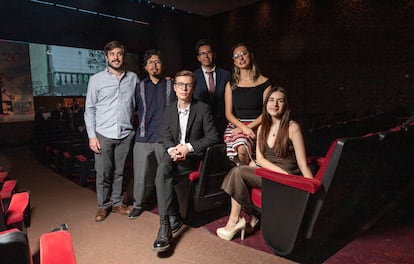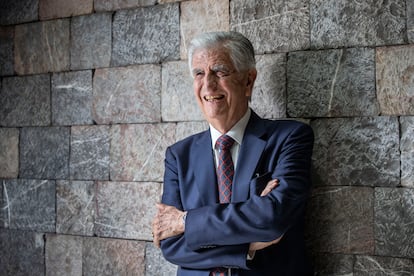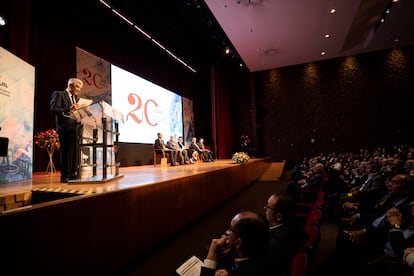A literary incubator in Mexico celebrates its 20th anniversary
The foundation nurtures aspiring young writers with tutors and mentors like Irene Vallejo, Sergio Ramírez, Juan Villoro and Javier Cercas


There’s a laboratory at 16 Liverpool Street in Mexico City’s Colonia Juárez neighborhood, but there is no scientific equipment here. It’s a place where people experiment with words in a beautiful 19th-century mansion. This is the Fundación para las Letras Mexicanas, a foundation where a group of young writers — novelists, poets, essayists and playwrights ― create works they hope will give them a place in literary history. For the past 20 years, this hotbed of creativity has nurtured a Mexican literary renaissance that would make the old masters proud. Young writers come here to study the classic Golden Age poets, dissect Don Quixote to discover the secrets of Cervantes, or immerse themselves in the Shakespearean universe. Promising names like Valeria Luiselli, Jorge Comensal, Vicente Alfonso and Roberto Abad have emerged from these halls. “We are renewing a heritage but also forming a new literary tradition,” said Miguel Limón Rojas, president of the foundation.
Mexico City is on alert this spring morning because the dreaded earthquake alarms have sounded by mistake. Office workers dutifully file out of the buildings into the streets to wait for the all-clear sign, while the young writers remain focused on their work inside 16 Liverpool Street. It’s an ideal environment for inspiring creativity, with spacious rooms, wood floors and high ceilings. French windows overlook a beautiful and very green garden that looks like a Brontë sister might have imagined it. In this chaotic and noisy city, it’s an island of serenity where people can immerse themselves in their reading and writing.
A tutor guides the aspiring writers in each branch of literature (novels, essays, poetry and playwriting). The students regularly meet in groups to discuss the progress of their work. While they each receive a monthly stipend of $845 from the foundation, the most important thing is having a space to create and the opportunity to learn from the best teachers and great writers. Gabriel García Márquez, Carlos Fuentes, Irene Vallejos, Sergio Ramírez, Juan Villoro and Javier Cercas have all come here.

Miguel Limón talks about some of the literary masters who have mentored the writers here. “Gabo [Gabriel García Márquez] was wonderful. He told them to think carefully about the novel’s first sentence, because everything else depends on it. When asked about style, he said, ‘Ah, that’s the carpentry work — if you want to go far, you must work hard.’” Cercas told them that writing takes a lot of courage, but above all, honesty. “They often give advice about life itself. We all want them to have opportunities to meet role models — honest, dedicated, courageous writers who have produced exemplary work,” said Limón.
It’s advice that resonates with Giacomo Orozco, a 22-year-old scholarship recipient who is working on a novel with his tutor. “It’s incredible. I’ve known about the foundation since I was 17, and coming here was a dream come true. I used to write at home, all alone. I didn’t interact with other writers. This opportunity has given me exposure to all sorts of reading material and teachers. It’s wonderful to be infected — in the best sense — with these influences and role models. Otherwise, this [growth] would have taken me years,” said Orozco.
His friend, José Luis Osorio, is also grateful for the foundation’s support as he learns the craft of playwrighting. “It’s a wonderful place that encourages writing. We’re able to focus only on writing and not think about anything else. The foundation also teaches the importance of discipline. I never had that approach to literature before. It’s not just about having an idea and writing whatever comes into your head. It’s about working on something every day, even though sometimes you don’t feel like it. The foundation fosters a rigorous approach to the craft,” said Osorio.

The tutors are not especially harsh, but they demand the best from these aspiring writers. “Modesty in the craft is prized, while arrogance is judged severely,” said Limón. He explains that the idea of creating this space arose from the need to nurture Mexican literature. The institution was born out of a foundation created by Octavio Paz to support young writers. The writers that have emerged from these halls over the last 20 years are all heirs of the legacy left by Paz, who won the Nobel Prize for Literature in 1990.
The foundation’s endowment is managed by a board of trustees and is used to fund scholarships, literary workshops for teenagers, and support writers who spend three months at the foundation’s “A Hundred Years of Solitude” studio to complete works in progress. The studio occupies the same Mexico City building where Gabriel García Márquez wrote his famous novel with the same title. “We wanted to nurture literature, and were clear from the start that it would be very important to give opportunities to young people so that they can dedicate themselves to the profession,” said Limón.
This laboratory, or incubator, as the staff likes to call it, has been hard at work for the past 20 years to bring new luster to Mexican literature. A new generation of writers can experiment with words alongside the masters, seeking their own styles and paths. “This scholarship [for aspiring writers] is crucial because it’s the encouragement they need to soar to new heights,” said Limón. Perhaps another Mexican Nobel Prize winner — an Octavio Paz descendant — will emerge from here.
Sign up for our weekly newsletter to get more English-language news coverage from EL PAÍS USA Edition
Tu suscripción se está usando en otro dispositivo
¿Quieres añadir otro usuario a tu suscripción?
Si continúas leyendo en este dispositivo, no se podrá leer en el otro.
FlechaTu suscripción se está usando en otro dispositivo y solo puedes acceder a EL PAÍS desde un dispositivo a la vez.
Si quieres compartir tu cuenta, cambia tu suscripción a la modalidad Premium, así podrás añadir otro usuario. Cada uno accederá con su propia cuenta de email, lo que os permitirá personalizar vuestra experiencia en EL PAÍS.
¿Tienes una suscripción de empresa? Accede aquí para contratar más cuentas.
En el caso de no saber quién está usando tu cuenta, te recomendamos cambiar tu contraseña aquí.
Si decides continuar compartiendo tu cuenta, este mensaje se mostrará en tu dispositivo y en el de la otra persona que está usando tu cuenta de forma indefinida, afectando a tu experiencia de lectura. Puedes consultar aquí los términos y condiciones de la suscripción digital.








































